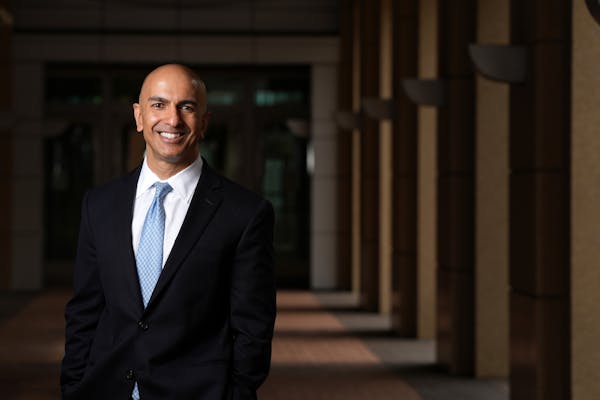Banks need to be ready to manage interest rate hikes if inflation remains stubborn, Federal Reserve Bank of Minneapolis President Neel Kashkari warned Wednesday, throwing his support behind a new recommendation for big lenders to set aside more capital.
"That would be a step in the right direction, and that would position us better in the future," Kashkari said of the proposal this week from the Fed's top bank watchdog, Michael Barr, who suggested boosting requirements for how much banks need to hold as a buffer against losses.
Some banking officials quickly pushed back against Barr's idea, saying it could hurt the economy and limit lending.
The Minneapolis Fed president weighed in on the situation during a National Bureau of Economic Research panel, where experts discussed potential conflicts between the priorities of ensuring bank solvency and taming inflation.
"If inflation proves more entrenched than expected, policy rates might need to go higher, which could further reduce asset prices, increasing pressure on banks," said Kashkari, who is a voting member of the Fed's interest-rate-setting committee this year. "In such a scenario, policymakers could be forced to choose between aggressively fighting inflation or supporting banking stability."
The Minneapolis Fed published an essay from Kashkari ahead of the event, in which he said banks are unlikely to take steps to prevent potential losses. Following the collapses of Silicon Valley Bank, Signature Bank and First Republic Bank, he instead called on bank supervisors to run high-inflation stress tests to ensure institutions have the capital to absorb a potential hit.
Stress tests, which evaluate potential losses and revenue under different conditions, can identify at-risk banks and those facing potential capital shortfalls. If issues arise, he suggested banks could come up with plans to quickly tackle them.
The Fed also conducts annual supervisory stress tests, checking how big banks handle hypothetical economic circumstances like rising unemployment and falling real estate prices. Barr is pushing to expand that testing process. This year's results, released in June, found the 23 largest banks had enough capital to manage losses in a downturn and keep lending.
"Although today the banking system overall is sound and resilient, bank stresses nonetheless could emerge again. In my view, given the risks that these banks have taken on, the outlook for some regional banks largely depends on what happens to inflation," Kashkari stated in his latest essay.
While U.S. inflation has continued to cool, central bank officials have indicated they are likely to raise interest rates again at their next meeting later this month. Kashkari did not comment in his report on how he would vote.
Stress test results, along with capital preservation plans, would help reassure investors and the public that banks can survive high inflation, Kashkari wrote. He pointed to tests the Federal Reserve ran in 2009, which he said "restored confidence and ultimately signaled the end of the [Global Financial Crisis]."
This is not the first time Kashkari has highlighted the importance of sufficient capital to protect the banking system. The Minneapolis Fed president served in the U.S. Treasury Department during the Great Recession. Since that time, he's been pushing for higher capital requirements for banks.
His comments this week align with Barr's proposal Monday. The Fed's vice chair for supervision said at a Bipartisan Policy Center event that he will push for new capital standards for banks with $100 billion or more in assets.
That plan fails to consider negative consequences of forcing banks to hold more capital, American Bankers Association President Rob Nichols said in a statement.
"Higher capital requirements come at a cost to the economy, and regulators have other existing regulatory tools to manage risks, including those that led to the recent bank failures," Nichols said.
The idea needs to go through a comment period.
"The failure of [Silicon Valley Bank] and other banks this spring were warning signs that banks need to be more resilient, and need more of what is the foundation of that resilience," Barr said, "which is capital."

Missed insulin doses cause complications. A new Medtronic app can detect when patients forget a dose.

A California road trip helped a Minneapolis design firm bring Lagunitas back to its roots

Spine surgeon built Burnsville campus to operate on patients others deemed too risky
Water reservoir temporarily shut off after vandals tamper with West St. Paul holding tank

